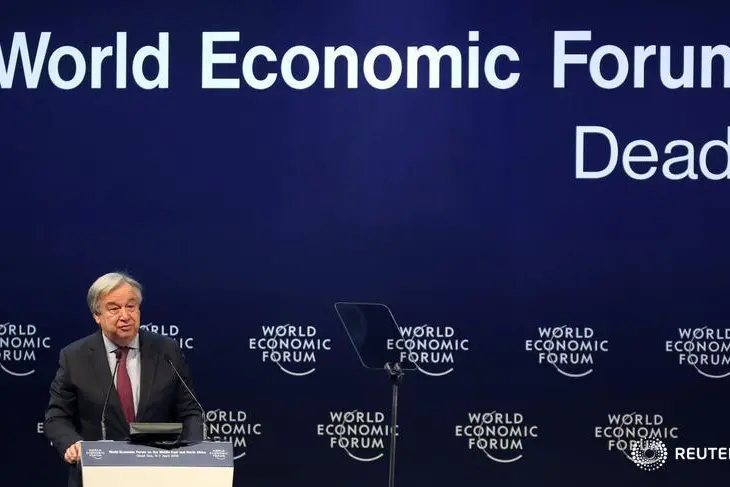PHOTO
The World Economic Forum’s Global Risk Report is usually a signal for the world’s movers and shakers to dust off the snow boots and start looking up Zurich train timetables as a prelude to the annual meeting in Davos. Not this year, however, as the big bash has been canceled for the second year running.
Despite the absence of a gathering in the snowy Swiss Alps, the GRR in 2022 was pretty much in line with the standard format — a beautifully written combination of apocalyptic warning, exhortations to trust in “dialogue” and “partnership,” and a fundamental belief that, if only everyone was like the Davos attendees, the world would be a better place.
I detected rather more gloom than in previous GRRs, but I suppose two years into a global pandemic, with the death toll approaching 6 million, that is only to be expected. “As 2022 begins, COVID-19 and its economic and societal consequences continue to pose a critical threat to the world,” the WEF said. No kidding.
The level of pessimism among the 12,000 respondents to the WEF’s questioning — mainly members of the C-suite elite — was genuinely shocking. Only 16 percent feel positive and optimistic about the outlook for the world and only 11 percent think the post-pandemic recovery will accelerate. Maybe the Davos apres-ski would not have been so jolly had the event gone ahead.
The big reason for this party-pooping gloom is climate change. Concerns about the planet ran throughout the GRR’s narrative and will continue to do so for a long time.
“Over a 10-year horizon, the health of the planet dominates concerns: Environmental risks are perceived to be the five most critical long-term threats to the world, as well as the most potentially damaging to people and planet, with ‘climate action failure,’ ‘extreme weather’ and ‘biodiversity loss’ ranking as the top three most severe risks,” the WEF said.
Moreover, climate fears spill over into virtually all other areas of the WEF’s domain. “A disorderly climate transition will exacerbate inequalities,” the report said, highlighting the risks to economic progress, societal cohesion and global development that will follow from climate action failure.
Usually, the WEF looks to technology to get the world through such challenges, but even that glimmer of light was missing in the 2022 report. Instead, it served up a list of cyberthreats, digital weaknesses and even extraterrestrial challenges.
There are simply too many rockets being launched by the likes of Elon Musk and Richard Branson, with the possibility that space travel will become impossible due to an orbiting barrier of junk spreading across the exosphere — something called the “Kessler Collapse,” according to the WEF.
That old GRR chestnut of “geopolitical tensions” was there as ever, with the China-US confrontation still the biggest threat to world peace and security.
But readers of the GRR in the Middle East can take some small grain of relief that the geopolitical strains in the region appear to have dropped well down the list of dangers. The region was not mentioned at all in the survey of geopolitical risks, apart from the possibility that refugees from Afghanistan and other regional countries torn by civil strife would add to a growing global migration crisis.
Digging deep into the report’s entrails reveals that the Davos types in the Middle East are worried about more mundane things. In Saudi Arabia, for example, the biggest fear among respondents to the WEF survey is “failure to stabilize price trajectories,” which is WEF-speak for inflation.
Although “human-made environmental damage” and “infectious diseases” appear in the list of Saudi concerns in 2022, along with “interstate conflict,” “fracture of interstate relations” and “prolonged economic stagnation” lower down the list, the top worry in the Kingdom is rising prices in the supermarket, the GRR would appear to show.
The UAE was also focused on the nitty-gritty, rather than environmental gloom: Infectious diseases, asset bubble bursts and debt crises were the Emirates’ top concerns.
Amid all the depression brought on by climate change, COVID-19 fears and the other horsemen of the WEF apocalypse, that is somehow reassuring.
- Frank Kane is an award-winning business journalist based in Dubai. Twitter: @frankkanedubai
Copyright: Arab News © 2022 All rights reserved. Provided by SyndiGate Media Inc. (Syndigate.info).





















